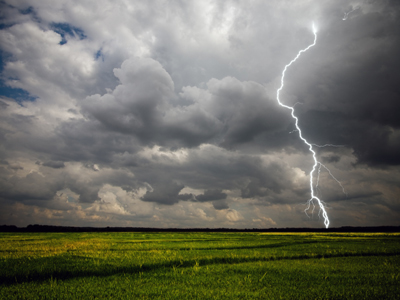
Ask the AI Tutor
Need help with Physics - Sound Waves (AQA)? Ask our AI Tutor!
AI Tutor - Lucy
Connecting with Tutor...
Please wait while we establish connection

Count the seconds between a flash of lightning and a rumble of thunder and divide by 3 to get its distance in km.
Physics - Sound Waves (AQA)
Explore how sound waves travel through solids, liquids and gases, how echoes and refraction happen, and why microphones and oscilloscopes help us see sounds we normally only hear.
1 .
The Apollo mission astronauts on the surface of the Moon needed radios to talk to each other, even when they were standing beside one another. Why?
Spacesuit material is too thick to hear through
There is no atmosphere on the Moon
The Moon is too noisy to allow a normal conversation
The Moon has less gravity than Earth
Sound waves require particles to travel from one place to another
2 .
As a sound wave passes, the particles of the medium are alternately compressed and uncompressed. Areas where the particles are not compressed are called what?
Decompressions
Rarefactions
Satisfactions
Benefactions
The areas where the particles are compressed by the vibrations of the wave are unsurprisingly called compressions!
3 .
Which of the following statements is true of an echo?
An echo is someone in the distance repeating what you say
An echo is only heard by the person who created it
An echo is as loud as the original sound
An echo is a sound wave that has been reflected
Hard, flat, smooth surfaces create the best echoes
4 .
Which of the following pieces of equipment is not required to see a sound wave?
Cathode-ray oscilloscope (CRO)
Ripple tank
Microphone
Loudspeaker
You would also need a signal generator and amplifier to make the loudspeaker make a sound and to control the frequency of sound produced
5 .
A student looked up the speed of sound for several different media and noticed a pattern - it was fastest in solids and slowest in gases. Which of the following statements is the correct reason for this?
The particles of solids are denser than gases
The particles of solids are less dense than gases
The particles of solids are further apart than in gases
The particles of solids are closer together than in gases
Sound waves travel as vibrations so if the particles are closer and fixed in place, they can pass on the vibrations faster. Gases have a slower speed of sound as their particles are much further apart
6 .
Using an oscilloscope, if you heard two waves of identical pitch but one was louder than the other, what would you see?
The crests of the louder wave would be closer together
The crests of the louder wave would be taller
The crests of the louder wave would be further apart
The crests of the louder wave would be shorter
The CRO displays sound waves as transverse waveforms. Louder waves carry more energy and therefore the crests will be taller than the quieter sound
7 .
Sound is a longitudinal wave. This means that the vibrations travel in which direction?
At 90 degrees to the direction of the wave
At 45 degrees to the wave
In the same direction as the wave
In the opposite direction to the wave
The vibrations are in fact backwards and forwards in time with the vibration causing the sound
8 .
Sound of a short wavelength makes what kind of noise?
High pitch
Low pitch
High volume
Low volume
A short wavelength means it is vibrating very quickly (has a high frequency)
9 .
If you count the seconds between a flash of lightning and the rumble of thunder, then divide the time by three, you get the approximate distance in kilometers to the lightning. Why do you divide by three?
Sound travels at 330 m/s
Sound travels three times faster than light
Sound travels at 3,000 m/s
Light travels three times faster than sound
In three seconds sound will travel 990 metres, which is about a kilometer so dividing the total number of seconds by three gives you the approximate distance the sound will have travelled since it was made. On the surface of the Earth, you can regard light as travelling instantaneously (it could go right round the Earth's equator 7 times in a second)
10 .
Sound waves diffract. What does this mean?
As they pass an object or go through a gap that is approximately the same size or less than their wavelength, they spread out
As they pass an object or go through a gap that is considerably smaller than their wavelength, they spread out
As they pass an object or go through a gap that is much bigger than their wavelength, they spread out
As they pass an object or go through a gap that is approximately the same size as their wavelength, they come together and get louder
Diffraction happens to all waves - light, sound, infrared, gamma etc...
**Unlimited Quizzes Await You! 🚀**
Hey there, quiz champ! 🌟 You've already tackled today's free questions.
Ready for more?
Ready for more?
🔓 Unlock UNLIMITED Quizzes and challenge yourself every day. But that's
not all...
not all...
🔥 As a Subscriber you can join our thrilling "Daily Streak" against other
quizzers. Try to win a coveted spot on our Hall of Fame Page.
quizzers. Try to win a coveted spot on our Hall of Fame Page.
Don't miss out! Join us now and keep the fun rolling. 🎉
**Unlimited Quizzes Await You! 🚀**
Hey there, quiz champ! 🌟 You've already tackled today's free questions. Ready for more?
🔓 Unlock UNLIMITED Quizzes and challenge yourself every day. But that's not all...
🔥 As a Subscriber you can join our thrilling "Daily Streak" against other quizzers. Try to win a coveted spot on our Hall of Fame Page.
Don't miss out! Join us now and keep the fun rolling. 🎉






